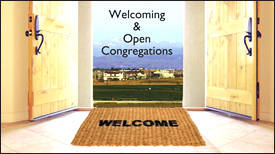A MOTION urging the provision of pastoral arrangements for prayer and thanksgiving with members of the Church who enter into legally recognised same-sex unions will be presented, debated and voted on at the C of I General Synod in Limerick on May 5th (see motion below). It is being proposed by Dr Leo Kilroy (hon. secretary of Changing Attitude Ireland) in a personal capacity and is seconded by the Revd Brian O’Rourke. Changing Attitude Ireland (CAI) fully endorses the proposal and hopes for a warm reception for the motion.
Given the increasing number of same-sex civil marriages in Ireland since last year’s Referendum, the matter of spiritual support from the Church for such unions has become urgent.  It is regrettable that the Select Committee on ‘Human Sexuality in the context of Christian Belief’, meeting over the past three years and now being dissolved, has made no recommendations in this area, and indeed was not asked to do so. So, we are still no closer to resolving the plight of members of the Church of Ireland who have entered into same-sex civil marriages but who have been denied any public recognition or celebration of their life-changing union in their church.
It is regrettable that the Select Committee on ‘Human Sexuality in the context of Christian Belief’, meeting over the past three years and now being dissolved, has made no recommendations in this area, and indeed was not asked to do so. So, we are still no closer to resolving the plight of members of the Church of Ireland who have entered into same-sex civil marriages but who have been denied any public recognition or celebration of their life-changing union in their church.
The motion to be proposed at this year’s Synod seeks to address this omission.
In supporting the motion CAI realises its potential to provoke heated discussion. However strong the feelings on either side, though, we pray that congenial relations will be maintained between all parties to the debate. So, what are the salient points at issue here? Essentially, progressive Christians believe that there are no impediments to pastoral accommodation being made for public prayer and thanksgiving with a same-sex couple who have entered into a civil marriage, by a priest so disposed to do so within the Church of Ireland. Note that all that is being proposed here is that the bishops bring to next year’s General Synod a strategy to enable pastoral arrangements for public prayer and thanksgiving in a church setting for those in same-sex unions. Neither “marriage” or “blessing” ceremonies as such are envisaged.
Traditionalists may contend that such a provision is contrary to Church teaching, citing anathemas against sexual contact between two males in the law of ancient Israel and Paul’s diatribe against various sexual irregularities, seen as the results of idolatry, in Romans 1. They may also argue that any life-partnership of a sexual as well as a social nature, whether named “marriage” or not, must be between one man and one woman, intended to be lifelong and open to the procreation of children, and that this requirement negates the possibility of same-sex unions being in any way celebrated in church.
But those of a progressive viewpoint consider the more spiritual dimension of marriage or life partnership to be of equal importance to the biological one. We note the Prayer Book’s assertion that God intends married partners to be of help and comfort to each other in sickness and in health, and believe they sustain each other in their walk with God and thus benefit the life of the Church and the community around them. CAI believes strongly that the Church should actively support such unions; that it is our Christian responsibility to not reject and condemn gay people, but rather to love, embrace and cherish them in the fellowship of Christ’s Church.
The basis for such belief is firmly grounded in the scriptures and in the Love Command of Jesus. What God wants most of us, his children, is love – love toward our fellow human beings and love toward Him, our Heavenly Father, as Jesus emphasises in asserting the two great commandments, to “love God” and “love your neighbour” (Mark 12:28-34). And in John’s Gospel, the love of neighbour is stressed as an instrument of evangelism:
A new commandment I give to you, that you love one another; even as I have loved you, that you also love one another. 35 By this all men will know that you are my disciples, if you have love for one another.” John 13: 34-35 (RSV)
It is to this love that Paul refers in what must surely be the greatest challenge to the traditionalist view of love and marriage when he says:
“Owe no one anything, except to love one another; for he who loves his neighbour has fulfilled the law. The commandments, “You shall not commit adultery, You shall not kill, You shall not steal, You shall not covet,” and any other commandment, are summed up in this sentence, “You shall love your neighbour as yourself.” Love does no wrong to a neighbour; therefore, love is the fulfilling of the law.” Romans 13:8-10 (RSV)
This was a revolutionary statement for Paul to make in his day. For some, it may be revolutionary even now. The essence of it is: “Love trumps Law, every time”. Legalistic regulations, as imposed by the scribes and Pharisees in Jesus’ day, are not of God, even when justified by words from scripture, if they neglect the basic principle of dealing with one another in a truly loving manner.
The passage above from Romans 13 is the conclusion of Paul’s great argument that we as Christians are no longer under the law, as already stated in his earlier Epistle to the Galatians where he wrote:
“For you were called to freedom, brethren; only do not use your freedom as an opportunity for the flesh, but through love be servants of one another. For the whole law is fulfilled in one word, “You shall love your neighbour as yourself.” Galatians 5:13-14 (RSV)
If then we accept that what Paul has written here is, indeed, a command from God how then can any sincere Christian maintain that a relationship that evidences the fruits of the Spirit and reflects the life of loving service commanded here, is not of God simply by virtue of the gender of the two people involved?
It is for these reasons that I urge you to lend your support to the motion below, that will be presented at General Synod 2017 on Friday 5th May. Clearly, we see, there is no impediment to a same-sex couple marking their life-long commitment to each other, through prayer and public thanksgiving with a member of the clergy of the Church of Ireland, at a suitable time and in a suitable manner.
Scott Golden
Chair
Changing Attitude Ireland
- PRIVATE MEMBER’S MOTION
Proposer: Dr Leo Kilroy
Seconder: Revd Brian O’Rourke
Notwithstanding the diversity of conviction regarding human sexuality, and in order to maintain the unity of the Church of Ireland, the General Synod
- Acknowledges the injury felt by members of the Church who enter into loving, committed and legally-recognised, same-sex relationships, due to the absence of provision for them to mark that key moment in their lives publicly and prayerfully in Church.
and - Respectfully requests the House of Bishops to investigate a means to develop sensitive, local pastoral arrangements for public prayer and thanksgiving with same-sex couples at these key moments in their lives, and to present their ideas to General Synod 2018, with a view to making proposals at General Synod 2019.
The development of any such pastoral arrangements should not infringe Canon 31 and the facilitation of such arrangements would not impair the communion between an individual bishop or diocese with any other bishop or diocese of the Church of Ireland.
END

